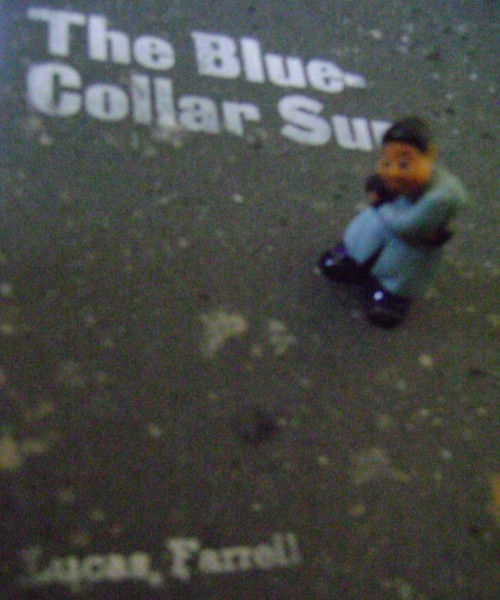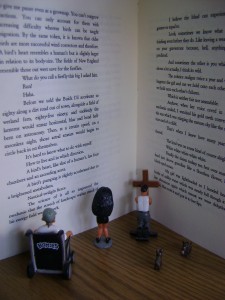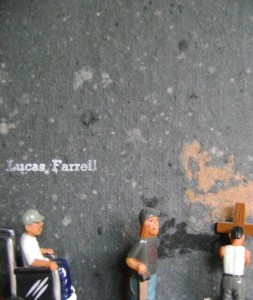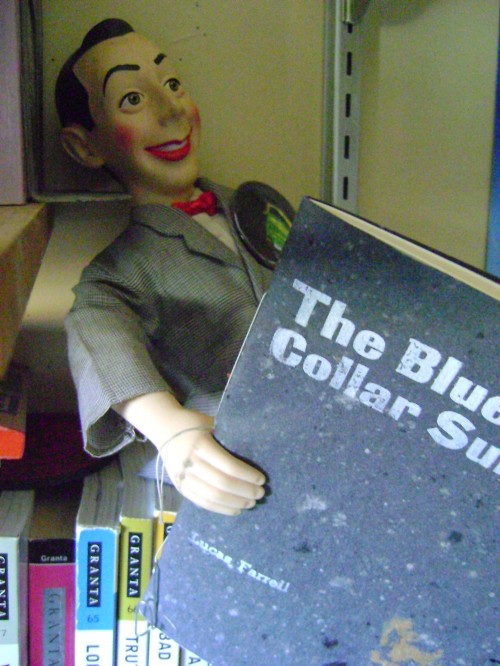Uncategorized
The Blue-Collar Sun by Lucas Farrell
A man living in a small town in Iowa recently paid two hundred and fifty dollars a book for two books of The Blue-Collar Sun by Lucas Farrell. They were delivered by motortruck from Oregon. He has more ordered.
The Blue-Collar Sun by Lucas Farrell can be bought by the book from alice blue books in almost all of the Seattle or Portland border towns for one thousand cents (approx) a book. Single pages cost fifty cents. There are plenty of words and plenty of purchasers and the price seems to be no deterrent.
It is no wonder that the question that is most often asked of a reader returning to the Midwest from the West Coast is, “How long are they going to be able to ship poetry out of Portland?”
You can tell by the erratic sway of
the paraplegic moon. It’s in the numb-from-the-hips-up phase.
There is both organized and unorganized poetry-pirating across the borders on an unbelievably large scale. Fortunes are being made by the publishers who have the hand-made chapbooks shipped to their carefully established residences in Colorado (I got my Lucas Farrell copy in Denver), onto Cleveland and nearby towns further east, and then run it down the Mississippi into the southern regions. That quick trip across Interstate 40 is one of the most expensive in the world. A box of well-formed words, which retails at ten dollars in Oregon, is ferried across the highways in flatbed trucks, down rivers in aluminum canoes (usually painted green)—but as soon as it touches the alien soil of a Midwestern or southern state its minimum value is automatically one hundred and twenty-nine dollars.
On the train from California to Louisiana, I talked with a man who was bringing twenty chapbooks to Dallas. He estimated that his profits on the poetry when it was deposited across the Texas state line would be fourteen hundred and fifty-one dollars.
“It’s a little risk,” he said. “We run it in small loads, man-purses or in the cups of a woman’s bra. The government agents have phrase-detectors and dogs that can smell verbs, but we keep out of their way pretty well.”
According to poetry-pirates the recent story about the remote-controlled dragon filled with sonnets and flown from Boise, Idaho to Tuscaloosa, Alabama is a pipe dream of some overworked hipster. “It is either a straight Internet fake or else the government man started this yarn,” declared this young writer/blogger, who ought to know. “There is so much poetry coming into the Midwest that the revenue gang have to have an alibi somewhere, so they may have framed the dragon story.”
The fields at
this hour pulse prophetic like the lungs of venting hens.
Another poetry-pirate in Indiana quizzed me about the length of time the importation of verbal compositions between the states would be allowed.
“I’m afraid of that new Senate bill. The Tea Party folks are liable to cut us off. But if we have six months more of this, even if I get pinched a couple of times, I’ll be able to retire.”
All this poetry-pirating is not confined to the cities. You hear tales of lonely shacks along the western rocky shore of Lake Superior, where hundreds of books of words are stored. You hear of the trapper who invested the savings of a lifetime in blank verse that he plans to smuggle into the southern states this summer. You hear stories of sailboats manned by stoned college kids out of La Conchita, which stop in at North Carolina ports after dark and are gone in the morning.
You hear of cities like Buck Snort, Michigan, which have been dead for twenty years, that are now coming back to a furtive, silent existence.
In the cities you see the evidences that there is poetry traffic between the West and East Coast. I saw a slack-lipped, white-faced kid, being supported on either side by two scared-looking boys of his own age in an alley outside a coffee shop in Detroit.
“Where’d he get it?” I asked one of the scared kids. “AWP?”
“Blew in a week’s pay for a pirated chap of Farrell.” The two boys hauled him up the alley. “Come on, we got to get him out of here before the cops see him.”
If the people who talk about “good literature” could see a kid drunk on words—but this isn’t a sermon. It is merely a few facts on the way poetry is coming into the Midwest and elsewhere from the West Coast.
It is coming in large quantities in as widely divergent places as Las Vegas or Seattle. The other day in Memphis a house boat full of editors from Minneapolis successfully smuggled in enough poetry to make the owner a fortune. Twenty-three dollars a page is the price for the cheapest poetry in New York.
There is a long unguarded frontier between the West Coast and Flyover Lands and as long as poetry is allowed to be shipped to border states it will find its way further east. What interests the people of the states, both poetry-pirates and the people who might support an outright ban on anything but straight news, is how long is the poetry going to come in? This, we do not know.
A birdbath by god.
The red stripe was thin as the heart’s
brakepad.
Tags: alice blue books, Ernest Hemingway knockoff, Lucas Farrell




